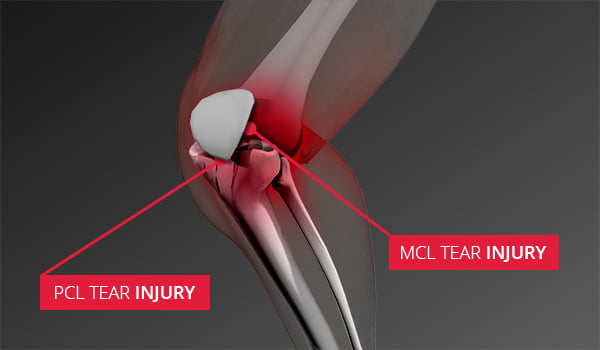
SYMPTOMS OF MCL OR PCL INJURY
- MCL injury may include pain and tenderness along the inner part of your knee.
- PCL injury may include pain, ranging from mild to severe, depending on how serious the injury is.
- Stiffness or swelling.
- A feeling that the injured knee may give way under stress or may lock or catch.
- An audible pop at a moment of injury.
- Knee tends to slip out of joint, feels unstable, and swelling and pain hinder movement.
POTENTIAL CAUSES OF MCL OR PCL INJURY
- Injuries to the MCL and PCL most often happen as result of traumatic force.
- MCL injuries are more likely when the knee is hit directly on its outer side. This stretches the ligaments on the inside of the knee too far or can tear them.
- PCL tears often are associated with traumatic injuries rather than sports injuries.
- PCL and MCL tears can happen when the knee is violently forced backward or when the front of the shin is hit hard, for example when the knee strikes the dashboard during a car accident.
DIAGNOSIS
MCL AND PCL INJURY TREATMENT OPTIONS
Treatment options for MCL and PCL injuries vary depending on the severity of injury. Some of these injuries will heal on their own after a few weeks of rest and the use of anti inflammatory medications, ice, compression to reduce swelling, and even the use of crutches. To keep the knee from moving, your doctor may recommend a lightweight cast or brace that allows your knee to move backward and forward but limits side-to-side motion.
A torn MCL rarely requires surgery. When surgery is performed, it is usually done through a small incision on the inside of your knee. It is not done arthroscopically, since this ligament is not inside the knee joint. If the medial collateral ligament has been torn where it attaches to the thighbone (femur) or shinbone (tibia), the surgeon will re-attach the ligament to the bone using large stitches or a metal screw or bone staple. If the tear was in the middle of the ligament, the surgeon will sew the torn ends together.
Isolated PCL tears are usually treated with rehabilitation rather than surgery. However, your doctor may recommend surgery if you have other ligament injuries along with the tear. The surgical procedure usually will reconstruct your PCL using a graft. The graft serves as a scaffold for the PCL reconstruction.
Do you have a knee injury or pain in your knee that might be a MCL or PCL Tear? Request an Appointment for a consultation with Sterling Medical Group.
